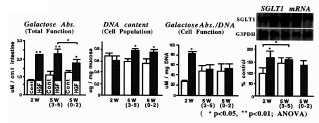Abstracts
1998 Digestive Disease Week
#983
THE DIFFERENTIAL EFFECT OF HEPATOCYTE GROWTH FACTOR ON INTESTINAL ADAPTATION DEPENDS ON THE TIMING OF EXPOSURE. Y. Kato, K. Alavi, D. Yu, and M.Z. Schwartz. duPont Hospital for Children, Wilmington, DE and Thomas Jefferson University, Philadelphia, PA.
Aim: After massive small bowel resection (MSBR), the residual intestine undergoes an adaptive process. Previous rat studies demonstrated that this response was maximized 2wks after MSBR. Recently, we demonstrated that hepatocyte growth factor (HGF) further enhanced intestinal function and mucosal mass 3 wks after MSBR. However, the potential differential enterocyte response to HGF during and after adaptation is unknown. This study was designed to determine the effect of HGF on intestinal function at 2wks (early phase) and 5wks (chronic phase) after MSBR, and also to evaluate if the HGF effect on function persists after cessation of exposure. Methods: Thirty young adult male Sprague-Dawley rats underwent an 80% small bowel resection and placement of a jejunostomy tube. Ten rats had luminal perfusion of saline (Grp.1, n=5) or HGF at 75 µg/kg/d (Grp.2, n=5) for 2wks using a subcutaneously placed osmotic minipump begining immediately after MSBR. Ten rats received saline (Grp.3, n=5) or HGF at 75 µg/kg/d (Grp.4, n=5) begining 3wks following MSBR and lasting for 2wks. Ten rats received saline (Grp.5, n=5) or HGF at 75 µg/kg/d (Grp.6, n=5) for 2wks begining immediately after MSBR. Two wks (Grps.1 and 2) or five wks (Grps.3, 4, 5 and 6) following MSBR, [C14]galactose absorption and mucosal DNA content were measured in the remaining intestine of each rat. To evaluate the effect of HGF on the SGLT1 carbohydrate transporter, Northern blot analysis (shown below) was performed after total RNA extraction and shown as % control in the bar graph.
Results:

Conclusions: HGF enhanced carbohydrate absorption in the residual small intestine in both the early phase (2wks) and the chronic phase (5wks) after MSBR. In the early phase HGF enhanced carbohydrate absorption by an increase in enterocyte function, but not its population. In the chronic phase the HGF enhanced carbohydrate absorption was charactalized by an increase in enterocyte population. These data suggest that there are different mechanisms by which HGF enhances intestinal function during and after adaptation. The HGF induced enhanced function was retained 3wks after cessation suggesting a more lasting effect on the enterocytes. HGF may be clinically useful for patients with Short Bowel syndrome.
Copyright 1996 - 1998, SSAT, Inc. Revised 29 June 1998.
|
 500 Cummings Center
500 Cummings Center +1 978-927-8330
+1 978-927-8330
 +1 978-524-0461
+1 978-524-0461